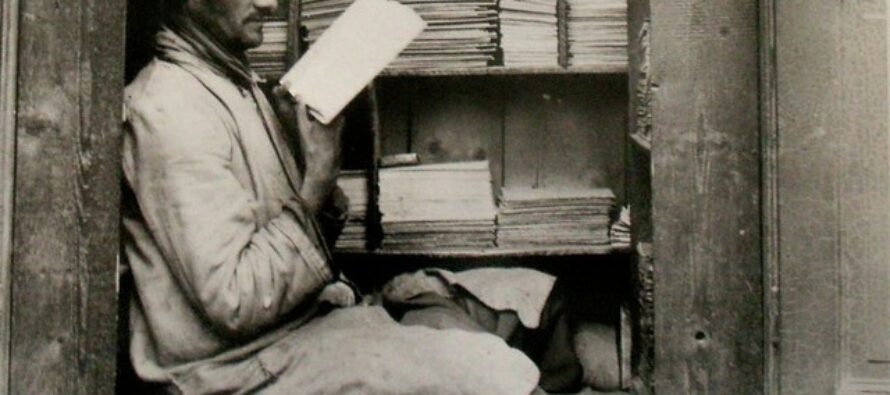Arabic literature: a little gold mine

![]()
Marcia Lynx Qualey runs a very interesting blog. Indeed, a fascinating one for many aspects. It is called “Arab literature in English” and it is an incredible source of information, reviews, suggestions…and much more things. In it you can find as said reviews of books, interviews with authors, extracts, a rich agenda telling dates and places of festivals, readings, meetings with authors. It is also for authors and publishers and translators as it provides information and deadlines for translation grants, literary competitions, awards… In one word, Marcia’s blog is indeed a little gold mine.
First of all can you tell us a bit about you ? Where do you live, when and how you move to Egypt ?
I relocated to Cairo in August 2001 with the scantest of Arabic background; by rights and education I should be doing Russian literature. But a few months earlier, in April 2001, I’d visited Cairo and had a Proustian experience of falling in love with the echoes of the accumulated Mahfouz in my brainstream. I didn’t start the blog until 2009, after I’d begun reviewing books as a sideline.
How did you get the idea of the blog ?
Although I was charmed with the idea of writing long essay-reviews in little-read magazines, I also wanted to be able to talk with fellow-readers (and potential fellow-readers) more immediately. In particular, I’d picked up Shakir Mustafa’s anthology of Iraqi stories and I wanted to write about them. Reviewing them was one possibility. But I wanted to have a discussion right away, and/or journal about them, and/or hear myself monologuing. A blog offered intriguing possibilities, genre-wise, for an intersection of forms. Also for the ability to be absolutely different every day. Quasi-academic! Chatty! Journalistic! Literary! Gossipy! Whatever struck my fancy and/or I could accomplish.
I probably would’ve quit blogging after a month or two, but Shakir encouraged me, and after that Ursula (of The Arabist), and after that others.
Clearly not enough Arabic woks are translated into English (even fewer, perhaps, in other languages !). Why do you think is that ?
As far as we Anglophones go, we just don’t like to publish and market translated literature.
As far as Arabic’s share of the translational pie, it’s become fairly large in the last 14 years — although many of these books are “printed” rather than “published.” (If a book receives almost no attention, has it really been published?) Still, it’s positive that there are a growing number of publishers bringing out Arabic literature. Yes, many of them do so with a sort of “forensic interest,” as Sinan Antoon terms it, but others have a sincere literary interest, and a generation from now, it’s possible that a growing number of Arabic literary translators and literary scholars who are in love with Arabic literature will bear beautiful fruit.
The Library of Arabic Literature project is also important. If we get a fuller picture of the scope of Arabic literature, rather than just the disembodied tip of it, we can engage more fully as readers.
How important would be translation and therefore literature in knowing each other and understanding each other, in a world where since we are children they try to put fear of the other inside us…
I don’t know. Arab authors are often asked a version of: “Can your novel change the world?” The same is asked of translations. A novel — or poem, or short story — can be transformational for an individual reader, absolutely, but it doesn’t (often) create social change, certainly not in any way that’s under the control of the writer or translator. Still, I do believe that reading great literature is important, and reading from mulitple traditions helps you appreciate the texture of all literature. Do you have to read Arabic literature to have a moral compass and do the right thing (by Syrian refugees, by Gazan civilians, etc.)? Nah. But should you read it anyway? Yes!
How do you choose what to post ? How do you organize your work and choices for the blog ?
Oh, it’s so eclectic that I’m embarrassed. I’m a bit like the mythical magpie, picking up shiny things wherever I see them. I talk to translators, librarians, scholars, publishers, and authors; read, troll Facebook, look at twitter; go to as many events as possible; ask around. I’m always grateful when someone brings me fresh news.
The blog can be followed at: arablit.org
Related Articles
Suelo ético
![]()
Iñaki Egaña | historiador Persigue a la moda y, como es habitual, solo sirve para esconder una gran hipocresía. «Un
Pamuk goes ‘naive, sentimental’
![]()
?HSAN YILMAZ ISTANBUL Orhan Pamuk’s new book gathers his series of Norton Lectures at Harvard University as the author prepares
Danish prosecutors say Roj TV voice of PKK, should be banned
![]()
(Photo: Cihan) 08 December 2011, Thursday / EMRE O?UZ, COPENHAGEN Copenhagen prosecutors overseeing an investigation into Kurdish-language television station Roj



I dugg some of you post as I cogitated they were handy handy